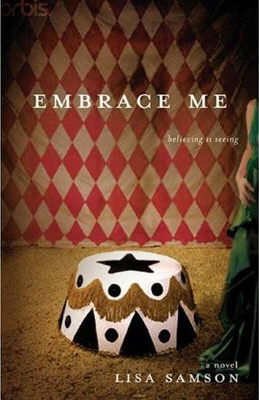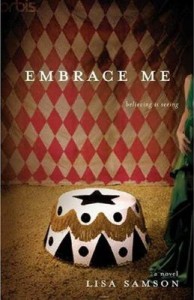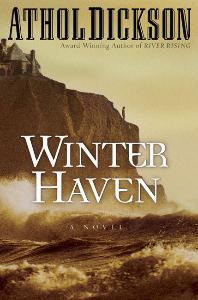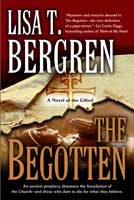
by Jason Joyner | May 20, 2008 | Blog, CFBA, fiction, reviews

The CFBA Tour today features award-winning author Lisa Samson and her latest book, Embrace Me.
The back cover copy reads, “When a ‘lizard woman’, a self-mutilating preacher, a tattooed monk, and a sleazy lobbyist find themselves in the same North Carolina town one winter, their lives are edging precariously close to disaster…and improbably close to grace.”
That sums up the book very succinctly. Embrace Me is a character-driven novel, a story designed to explore the depths that forgiveness and redemption can reach. The plot revolves around mega-church pastor Drew Parrish confessing his sin to a Catholic priest in 2003, while freak show attraction Valentine winters in between carnival seasons in the quiet town of Mount Oak in 2008. The story bounces back between their timelines, as they battle their internal demons. Val may hide her burned face under a scarf, but both wounded souls have a true face they are hiding.
The plotline is a little convoluted and incredible at times, but the characterization and themes of Embrace Me keep this book an engaging read. The darkness that both Drew and Valentine struggle with are all too real and the interesting supporting cast draw the two wounded people toward grace. It is hard not to enjoy Lella the armless-legless woman, Augustine the tattooed and dreadlocked monk, and Rick the contortionist.
The book isn’t afraid to ask hard questions about true faith, and the glossy side of Christianity is strongly challenged. The Way is not easy, and it is hard to love the unlovable. Even when their cry is to “embrace me,” just the way they are.
If you would like to read the first chapter, go HERE

by Jason Joyner | Apr 25, 2008 | Blog, CFBA, fiction, reviews, suspense

Athol Dickson won a lot of acclaim and awards for his last book, River Rising. I didn’t read that one, so when his latest work, Winter Haven, was available for review, I didn’t want to miss out.
Winter Haven is the name of an island off the coast of Maine. Vera Gambles, a 24 year old accountant, travels there because the body of her long-lost brother, Sigmund or “Siggy”, had washed up on the north shore of the island. In the midst of the opening of old wounds, the question of how an autistic savant made it from Texas to the Atlantic is her main concern.
When she sees his body and finds he hasn’t aged from thirteen years ago, new questions arise.
What is the connection between this appearance, the strange fog over the north part of the island, the legend of a lost Puritan colony, a figure clothed in black, and Siggy’s body? Vera struggles with the strangeness of the island, her own demons, and the mysterious Captain Evan Frost in her journey to discover the secret of Winter Haven.
The characterization is probably the strength of the book. Vera is mousy and flawed – she’s not the gorgeous and confident heroine we see in so many other books, and to me, the change is welcome. She has a lot to overcome, and you’re not sure if she can rise to it. Evan Frost is very hard to pin down, and even the cranky widow has her moments of sympathy.
The book is an easy read, and it is fairly engaging. The book is written in first person, from Vera’s perspective. This allows the author to introduce a lot of suspense that she has problems figuring out, but some sections where she is wrestling with her past were confusing. I got bogged down a couple of times in these spots. The suspense is gripping at times, and overall I enjoyed the book, but it wasn’t my favorite in this genre.
I recommend the book, but honestly I would wait for paperback if I were to buy it for someone.

by Jason Joyner | Apr 25, 2008 | Blog, CFBA, fiction, reviews, suspense

Athol Dickson won a lot of acclaim and awards for his last book, River Rising. I didn’t read that one, so when his latest work, Winter Haven, was available for review, I didn’t want to miss out.
Winter Haven is the name of an island off the coast of Maine. Vera Gambles, a 24 year old accountant, travels there because the body of her long-lost brother, Sigmund or “Siggy”, had washed up on the north shore of the island. In the midst of the opening of old wounds, the question of how an autistic savant made it from Texas to the Atlantic is her main concern.
When she sees his body and finds he hasn’t aged from thirteen years ago, new questions arise.
What is the connection between this appearance, the strange fog over the north part of the island, the legend of a lost Puritan colony, a figure clothed in black, and Siggy’s body? Vera struggles with the strangeness of the island, her own demons, and the mysterious Captain Evan Frost in her journey to discover the secret of Winter Haven.
The characterization is probably the strength of the book. Vera is mousy and flawed – she’s not the gorgeous and confident heroine we see in so many other books, and to me, the change is welcome. She has a lot to overcome, and you’re not sure if she can rise to it. Evan Frost is very hard to pin down, and even the cranky widow has her moments of sympathy.
The book is an easy read, and it is fairly engaging. The book is written in first person, from Vera’s perspective. This allows the author to introduce a lot of suspense that she has problems figuring out, but some sections where she is wrestling with her past were confusing. I got bogged down a couple of times in these spots. The suspense is gripping at times, and overall I enjoyed the book, but it wasn’t my favorite in this genre.
I recommend the book, but honestly I would wait for paperback if I were to buy it for someone.
by Jason Joyner | Apr 25, 2008 | Blog, reviews, speculative fiction, theology
Okay, so the CSFF tour has moved on, but I want to post quickly on two questions that may arise from the book The Begotten.
First of all, what made this book “speculative”?
The book is set in a historical time (1300’s Italy), so it is clearly not science fiction. It is not really a fanatsy. Why did it end up in a book tour for speculative fiction? Well, it might be a little of a reach for the core audience for a focus of Christian sci-fi and fantasy. However, it focuses on alternative history with a mix of supernatural power and “speculation” on what would happen if certain letters of Paul, containing prophecies, was found at some time that led to the plot of the book. In my opinion, that premise is enough to support highlighting it during the CSFF tour. Plus, it was a very well written and enjoyable book, so what is the harm in promoting such a product when it is pretty close to the intention of the tour?
The other question is, isn’t the idea of a “lost” book of Scripture dangerous territory?
Yes, this premise is dangerous territory. If it was done by someone without respect for the Bible and Christian tradition, it would most likely be a book that I could not support and recommend. Again, a comparison to DaVinci Code comes to mind. Lisa Bergren clearly holds to ideas that show her deep love for Jesus and the gospel message. The book has a rich spiritual message (that doesn’t come across preachy), and it overall is a vehicle that combines truth and entertainment in a good way.
Now, there was some liberty with how her characters responded to the lost Corinthian level, and they probably acted a little too out of character for the time frame. They sounded like modern day Pentecostals a lot of the time, not like Roman Catholics confronted with strange new teaching that would be heretical. I think the answer to this will come in the conclusion of the series, but this could be a critique of the first book.
Fiction in general is only a “what if” that happens in the author’s mind. Intertwining fiction and the Bible can be a tricky issue. Randy Ingermanson has two novels about time travel that deal with the apostles. Anne Rice is writing a series based off of Jesus’ childhood, in areas of history that we have no record for, at least Biblically. One commenter suggested that it made the premise of the book a little harder to handle since Bergren used Paul. However, it also gives the premise more legitimacy since Paul did actually make extra correspondence to Corinth that we don’t have in the Bible.
Ultimately, I think Lisa did well in her book, and it must come down to that this is fiction, and not Bible study or teaching. We have to use discernment in ANY book we read, even if it is from a respected scholar, and whether it is fiction or non-fiction. Fiction is meant to be false, yet it can be an avenue for us to examine issues in the hypothetical. Fiction is above all creative, art, and entertainment, so we have to hold to that as a baseline regarding any book.
by Jason Joyner | Apr 25, 2008 | Blog, reviews, speculative fiction, theology
Okay, so the CSFF tour has moved on, but I want to post quickly on two questions that may arise from the book The Begotten.
First of all, what made this book “speculative”?
The book is set in a historical time (1300’s Italy), so it is clearly not science fiction. It is not really a fanatsy. Why did it end up in a book tour for speculative fiction? Well, it might be a little of a reach for the core audience for a focus of Christian sci-fi and fantasy. However, it focuses on alternative history with a mix of supernatural power and “speculation” on what would happen if certain letters of Paul, containing prophecies, was found at some time that led to the plot of the book. In my opinion, that premise is enough to support highlighting it during the CSFF tour. Plus, it was a very well written and enjoyable book, so what is the harm in promoting such a product when it is pretty close to the intention of the tour?
The other question is, isn’t the idea of a “lost” book of Scripture dangerous territory?
Yes, this premise is dangerous territory. If it was done by someone without respect for the Bible and Christian tradition, it would most likely be a book that I could not support and recommend. Again, a comparison to DaVinci Code comes to mind. Lisa Bergren clearly holds to ideas that show her deep love for Jesus and the gospel message. The book has a rich spiritual message (that doesn’t come across preachy), and it overall is a vehicle that combines truth and entertainment in a good way.
Now, there was some liberty with how her characters responded to the lost Corinthian level, and they probably acted a little too out of character for the time frame. They sounded like modern day Pentecostals a lot of the time, not like Roman Catholics confronted with strange new teaching that would be heretical. I think the answer to this will come in the conclusion of the series, but this could be a critique of the first book.
Fiction in general is only a “what if” that happens in the author’s mind. Intertwining fiction and the Bible can be a tricky issue. Randy Ingermanson has two novels about time travel that deal with the apostles. Anne Rice is writing a series based off of Jesus’ childhood, in areas of history that we have no record for, at least Biblically. One commenter suggested that it made the premise of the book a little harder to handle since Bergren used Paul. However, it also gives the premise more legitimacy since Paul did actually make extra correspondence to Corinth that we don’t have in the Bible.
Ultimately, I think Lisa did well in her book, and it must come down to that this is fiction, and not Bible study or teaching. We have to use discernment in ANY book we read, even if it is from a respected scholar, and whether it is fiction or non-fiction. Fiction is meant to be false, yet it can be an avenue for us to examine issues in the hypothetical. Fiction is above all creative, art, and entertainment, so we have to hold to that as a baseline regarding any book.

by Jason Joyner | Apr 23, 2008 | Blog, CSFF, reviews, speculative fiction
 I finally have a contender for favorite book of 2008.
I finally have a contender for favorite book of 2008.
Monday I posted about the Corinthian letters from Paul in the New Testament due to the featured book in the CSFF blog tour this month:
The Begotten. Written by Lisa T. Bergren, it is the first of the Gifted trilogy, with the second book
The Betrayed already available, and
The Blessed being released in fall 2008.
The Gifted trilogy is centered around a fictional “lost” letter of Paul, that speaks of a group called the Gifted who will arise to fight evil and proclaim God’s love with magnificent gifts. Father Piero is a Dominican priest in 1300’s Italy who is the chosen carrier of one section of this lost book, with other sections scattered by time due to factions trying to destroy the work. He meets Daria D’Angelo, a wealthy aristocrat in the city of Siena who is single because she was unable to conceive during a handfasting. The beautiful Daria has the gift of healing, and the two join together to complete their mission of bringing together the rest of the Gifted and following through with their prophesied destiny.
Sir Gianni is an Italian knight for the Vatican who is chasing a child-sacrificing Sorcerer through the Roman catacombs. After a harrowing chase, the Sorcerer escapes, and begins plotting to find the Gifted and twist their holy purpose to serve his vile plans. Also, Cardinal Boeri watches for both the Gifted and Sorcerer to further his agenda as well.
I wasn’t sure what to expect when I read the back cover. It has a bit of a Da Vinci Code feel from the cover. If only Dan Brown had respect for his subject matter and wrote more than cardboard characters, he might raise to the level of The Begotten. The book is not quite like Code, as it is fully set in a historical setting, but it is a very entertaining book.
Bergren manages to combine great historical research and detail with multi-dimensional characters who grow and have flaws and a moving, suspenseful plot. She keeps the reader guessing with who the “Judas” character might be, wondering if a character will be good or bad, and putting the Gifted in deeper peril through the book. I felt that I was living in the time, and the way I was drawn in to the story was very enjoyable. Sometimes the plot slowed as the characters seemed to wander around a little bit to set up a scene or plot twist in the middle, but overall the whole came together in a delightful package.
I ordered the next book, The Betrayed, before I finished the first one. I have a feeling I will be waiting impatiently for the fall when the series concludes. So if you are a fan of suspense, historical fiction, or speculative fiction, this book meets many tastes and ought to entertain and challenge with the powerful theme woven through the pages.
I want to post a little more about two questions:
What makes this book “speculative”?
Isn’t the idea of a “lost” book of Scripture dangerous territory?
Make sure to check back on this. In the meantime, see the author’s website and on Monday’s post visit some of my fellow tourmates’ sites. There’s good stuff always in the CSFF tour.



